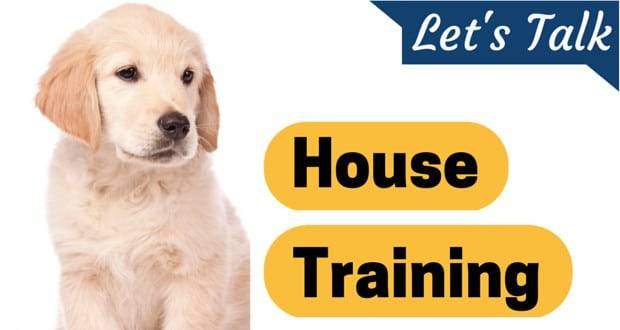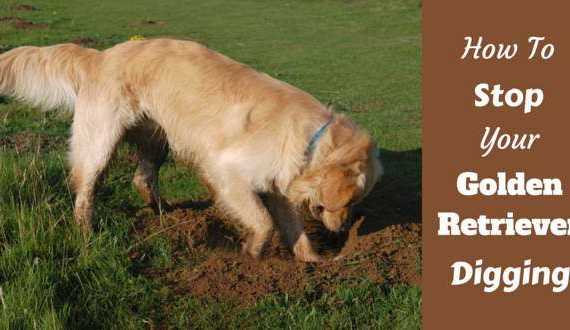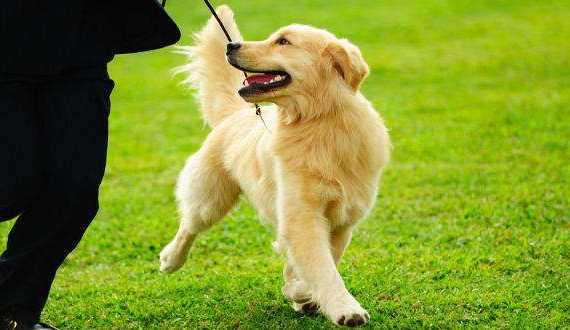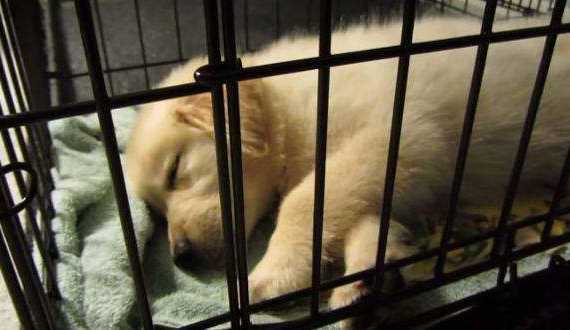Updated: August 9th, 2022

If you’ve adopted a shelter dog that’s not house broken or have a puppy you need to teach, this article can help you master the basics of effective house training.
Throughout, we’ll use “dog” and “puppy” interchangeably, but these solutions can apply to dogs of all ages who need house training.
Traditionally, a house-trained dog is one that understands that “business” should be done outdoors only, either in the yard or on walks. But with condos and high-rises gaining in popularity, a house-trained dog can now also refer to a dog that knows the specific area(s) to use as a toilet, whether that’s newspapers or special grass mats.
The methods described below can be used for either indoor/outdoor toilet training.
Things You Need To Know Before You Begin House Training
Every dog is different and you may find some puppies pick up house training much faster than others. As with any other type of dog training, the key to successful house training is patient repetition.
Realistic Goals: Average Time To Completely House Train Your Dog
As you might expect, puppies don’t have good control over their bladder and bowels.
- Larger dogs breeds typically gain control at ~12 weeks of age, and smaller dog breeds at ~16 weeks of age. These are just estimates of course—your puppy may need less or more time.
- Also, the smaller the bladder, the more the need for frequent toilet trips, so if you have a small puppy or a shelter dog that’s on the smaller side, you will have more opportunities for house training.
- On average, puppies can hold their bladder for 2 hours. Adult dogs should be allowed to relieve themselves at least 3-5 times a day.
- With a puppy, plan for a middle-of-the-night potty break.
- It’s also a good idea to take your puppy to the designated toilet area after a nap, before their bedtime and in the morning, and after exciting events such as visitors or playtime.
With consistent training, you can expect fewer and fewer “accidents” and a fully house trained puppy by the age of 6 to 8 months, while adult dogs generally take to house training much faster.
Guiding Principles: How To Get Your Dog To Understand House Training
Dogs really have just one rule for “business”: Don’t do it in your den. Otherwise, dogs rely on scent markers to map out their territory, so you need to guide them into adopting your way of thinking about toilet needs, that is: Not inside the house unless it’s in this one spot I say.
So make a habit of having only one designated toilet area, at least to start. This will help your puppy or rescue dog understand the difference between that particular spot and everywhere else.
Until your dog has understood the idea of the “right” place to go, be extra observant. Watch for any signs that your dog needs to relieve themselves.
Common signs that a dog ‘needs to go’ are:
- Turning in circles
- Sniffing the floor
- Bolting out of the room
- Restlessness
- Retreating to a corner
While your puppy needs toilet breaks, there’s one break you can’t have—a break from the routine. Keep to a specific daily routine and you’ll soon see your dog pick up house training.
Play To Instincts: How To Make House Training a Natural Behavior For Your Dog
Instead of fighting your dog’s natural instincts, try to understand where they’re coming from—and then use those instincts to your advantage.
Instinct #1: Seeking Out A Den
As mentioned, dogs have a natural instinct to seek out a den (any small, enclosed place) where they feel safe and protected. Not only that, but dogs learn to keep their den clean from a small age and continue that habit. After all, no one wants to sleep in a mess!
To use this denning instinct to your advantage, start with a crate that can act as a den for your puppy and then gradually increase the den area to include a play pen, and eventually, most of your home.
Instinct #2: Wanting To Earn Praise And Rewards
Psychology works on your puppy too. If they perform an action that leads to a treat or praise, then they’re more likely to repeat that action (and get another reward). So heavily praise them when they potty in the place you want them to!
The opposite is true as well. If you’re lucky to catch your dog relieving themselves in the wrong spot, correct with a firm “NO!” to reduce the chance of it happening again.
Instinct #3: Learning Good Behavior Through Repetition
Routine helps your dog understand the way of things. Repeated behaviors soon become a habit and then just a part of everyday life.
This is where consistency comes into play. Your dog absolutely can’t be confused about what to do (and what not to do) when it comes to house training.
Remember, you already have a lot going for you: Your dog wants to keep a clean den, wants to please you, and wants to learn from you.
Add in routine times for feeding, play, exercise and ‘potty breaks’ so your pup knows when and what to expect, then watch their mind and body learn and adapt to the routine. Before you know it, house training becomes almost easy!
Timing Things: How To Reduce The Number of “Accidents”
House training may seem like a full-time job, but there are ways you can shift your attention away from your puppy for short periods of time if you need to.
Once your dog has come to see their crate as a den, guide them into it whenever you need to focus on something else. While inside their den, they will do everything they can to ‘hold things’ and not soil it. This allows you a break from supervision safe in the knowledge they will not make a mistake in your home.
Before you pop them in their crate though, do make sure your dog has a chance to relieve themselves in the correct spot so you can “reset the timer” as it were, and so they aren’t full and uncomfortable while confined.
Once you’ve finished your task, take your puppy out of their crate straight to the correct toilet spot and praise them if they relieve themselves there.
Accident Prone: Is It Poor Training Or Health Reasons?
If you notice your puppy having more “accidents” than seems normal, have your vet check them over.
Typical reasons why dogs may need to relieve themselves more often than normal include:
- Stomach Flu (Gastroenteritis)
- Urinary tract infection
- Other medical issues that affect internal organs and genitalia
So if you suspect that your puppy’s issues are due to health reasons instead of house training, visit your vet as soon as possible.
Keeping Cool: The Correct Way to Handle Mistakes And “Accidents”
If you’re feeling irritated with house training your puppy, keep in mind one thing: It’s not on purpose.
Take responsibility for not paying attention to the cues of your dog or acting fast enough to correct the behavior before it happened.
Dogs of all ages, and puppies especially, cannot make the connection between soiling your home and your anger. Any “guilty” expression you might see isn’t actually an admission of guilt or a sign of understanding—it’s a submissive gesture trying to appease you.
So try to be understanding of the house training process and follow the above steps for success. Here’s what to do if…
You Happen To Catch Your Puppy In The Act
Shout “NO!” in a firm voice as quickly as you can. This may startle your puppy into holding it in—and give you the time you need to get them to the correct spot.
If your puppy doesn’t stop on command, it’s better to let them finish than risk having more messes to clean up while you rush your puppy to the right spot.
It’s important to stay calm and relaxed and absolutely don’t punish your puppy.
You Come Across A Mess After It’s Happened
The best thing to remember is that you don’t want any witnesses—namely, your dog.
Take your puppy out of the room and make sure they can’t come back to see you clean their mess.
Letting a dog see you pick up their mess says to them you’ve accepted it and will always take care of it, so there’s no reason for them to keep the den clean when you’re doing a fine job instead.
Be sure to give the soiled spot a deep clean to remove most of the odor. If you don’t, it may signal to your puppy that it’s a good place to go and may actually replace the “designed” spot in your dog’s mind.
But remember, you can teach your dog how to see your home as their den and reduce the number of “accidents” to zero if you follow the house training methods described in this article.
A Complete Guide To House Training From Totally Goldens
For more information on house training, please see our articles linked to below.
This series contains everything a Golden owner needs to know on the subject and should have your puppy or dog toilet trained in the fastest, most effective and painless way for all involved.
We strongly recommend reading through the whole series before you begin, to give yourself the skills and knowledge for the greatest chance at speedy success.
- Everything You Need To Know For Effective House Training
- The Best Way to House Train a Puppy: 4 Popular Methods
- The Role Food Plays In Your House Training Journey
- House Training – Step by Step Guide
Anything To Add?
Do you have your own tips and tricks for house training a dog or puppy? Please share with us in the comments!



